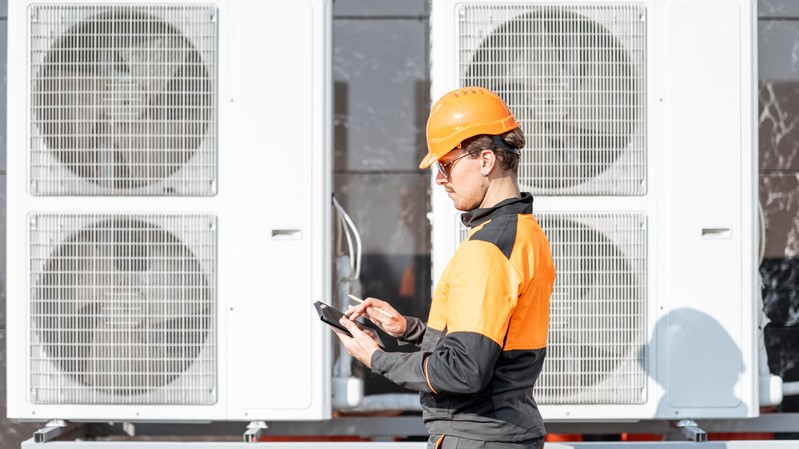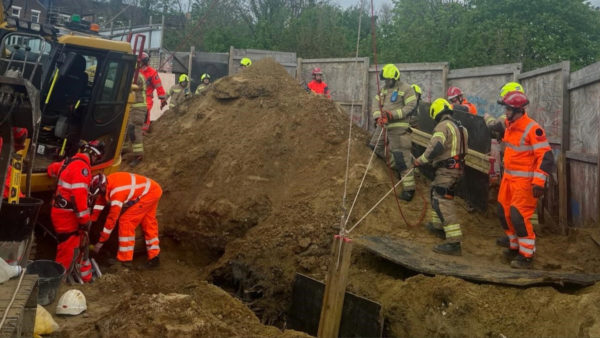
The government will incentivise consumers to replace their gas boilers in favour of heat pumps by offering £5,000 grants over the next three years.
The grants will be offered under the £450m Boiler Upgrade Scheme, starting in April next year.
As part of its new Heat and Buildings Strategy, the government said it would encourage homeowners to install more efficient, low-carbon heating systems and that the grants meant people would pay a similar amount to install a heat pump as they would a traditional gas boiler, based on the assumption that the typical cost of installing an air source heat pump is £10,000.
The £450m scheme is part of £3.9bn of new funding being announced today (19 October) by the government for decarbonising heat and buildings. This will fund the next three years of investment through the Social Housing Decarbonisation Fund, the Home Upgrade Grant scheme, the Boiler Upgrade Scheme and the Heat Networks Transformation Programme and reducing carbon emissions from public buildings through the Public Sector Decarbonisation Scheme.
The government has a target for all new heating systems installed in UK homes by 2035 to be using either low-carbon technologies, such as heat pumps, or supporting new technologies like hydrogen-ready boilers.
Meanwhile, to ensure electric heat pumps will be no more expensive to run than gas boilers, ministers want to reduce the price of electricity over the next decade by shifting levies away from electricity to gas. A call for evidence is expected to be published with decisions made in 2022.
And in a bid to grow the electric heat pump market and expand British manufacturing, a new £60m Heat Pump Ready innovation programme is being announced as part of the £1bn Net Zero Innovation Portfolio. The scheme will provide funding to drive technological innovation which will make systems smaller, easier to install and cheaper to run.
“This Heat and Buildings Strategy will help kick-start a cheap clean heating revolution, by bringing prices down for households and allowing companies to invest in scaling up their clean heating operations.”
Prime minister Boris Johnson said: “As we clean up the way we heat our homes over the next decade, we are backing our brilliant innovators to make clean technology like heat pumps as cheap to buy and run as gas boilers – supporting thousands of green jobs.
“The Heat and Buildings Strategy sets out how we are taking ‘no-regrets’ action now, particularly on heat pumps, whilst supporting ongoing trials and other research and innovation on our future heating systems, including on hydrogen. We will make a decision on the potential role for hydrogen in heating buildings by 2026, by learning from our Hydrogen Village pilot. Heat pump technology will play a key role in all scenarios, so for those who want to install them now, we are supporting them to do so.”
Business and energy secretary Kwasi Kwarteng said: “Recent volatile global gas prices have highlighted the need to double down on our efforts to reduce Britain’s reliance on fossil fuels and move away from gas boilers over the coming decade to protect consumers in long term.
“As the technology improves and costs plummet over the next decade, we expect low carbon heating systems will become the obvious, affordable choice for consumers. Through our new grant scheme, we will ensure people are able to choose a more efficient alternative in the meantime.”
Greg Jackson, CEO and founder of Octopus Energy, said: “This Heat and Buildings Strategy will help kick-start a cheap clean heating revolution, by bringing prices down for households and allowing companies to invest in scaling up their clean heating operations. When the new scheme launches in April, Octopus Energy will install heat pumps for about the same cost as gas boilers.
“Octopus has already committed £10 million investment to its research and development and training centre dedicated to the decarbonisation of heat, and has begun training engineers at the rate of 1,000 per year.”
Comments
Comments are closed.











What’s not covered is the need for professional services as part of any Heat Pump installation.
M & E design
Ecological survey
Structural survey
Environmental survey
Planning approval
Feasibility study
Geological survey ( for GSHP )
Under ground Existing services survey ( for GSHP )
May I suggest that £5,000 might not cover professional services before you even consider the installation
So, how does an ASHP produce the flow temperature required for a typical radiator central heating system (80C) in the dead of winter when the outside air temp is -5C?
Once again we see a comment about a heat pump not achieving 80°C flow temp in winter, but how many domestic boiler systems run at this temp either? How many non-condensing boilers get installed in domestic properties? Answer = none. How long has this been going on? Answer = years and years. Do condensing boilers need to achieve 80°C to heat a home? Answer = no. So if boiler installers have been installing systems in domestic properties that rely on achieving 80°C to heat the home in winter, they have been scamming their clients.
Heat pumps can generate more than enough heat to serve a water based loop in the home. You just have to size the radiators accordingly, as you do with a condensing boiler set to work in condensing mode, hence achieving the efficiency it is capable of, exactly like a heat pump.
Who says the heat emitters need to be radiators? Arguable they should not be, to achieve the high system efficiencies that decarbonisation is going to require.
The bit that is more difficult is the hot water, as it is indeed hard work for a heat pump to put out 60+°C, but there is solar HWS, electric heating or top-up and off-peak generation with reasonable storage to consider, amongst others.
People need to stop knocking heat pumps and re-think their strategies. Read some of the other articles in this excellent publication covering the inability/unwillingness of the industry to embrace change.
Think of history – did the introduction of Corgi registration kill off the domestic heating market? Did requiring plumbers to be Part P registered if they wanted to install electrical supplies kill off the market? No, the sector adapted and moved on, as it needs to now. It requires the willingness to say I can rather than I can’t.
Lots of emotional and extreme reactions on both sides, especially for the domestic market – but where are the accredited/tested performance curves for ASHPs that we can rely on when sizing systems. By focusing on insulation standards and sizing of radiators as a pre-requisite, it scares potential buyers into thinking that ASHP might barely be adequate, or just plain inadequate – especially at low ambient air temps when the need (and concern) is is greatest. How do you get to a verifiable VfM proposition in a reasonable pay-back period at this leading edge of the market transition without the data.